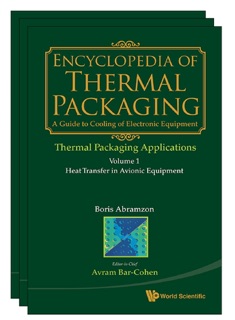Thermal and mechanical packaging — the enabling technologies for the physical implementation of electronic systems — are responsible for much of the progress in miniaturization, reliability, and functional density achieved by electronic, microelectronic, and nanoelectronic products during the past 50 years. The inherent inefficiency of electronic devices and their sensitivity to heat have placed thermal packaging on the critical path of nearly every product development effort in traditional, as well as emerging, electronic product categories. Successful thermal packaging is the key differentiator in electronic products, as diverse as supercomputers and cell phones, and continues to be of pivotal importance in the refinement of traditional products and in the development of products for new applications. The Encyclopedia of Thermal Packaging, compiled in four multi-volume sets (Set 1: Thermal Packaging Techniques, Set 2: Thermal Packaging Tools, Set 3: Thermal Packaging Applications, and Set 4: Thermal Packaging Configurations) provides a comprehensive, one-stop treatment of the techniques, tools, applications, and configurations of electronic thermal packaging. Each of the author-written volumes presents the accumulated wisdom and shared perspectives of a few luminaries in the thermal management of electronics. The four sets in the Encyclopedia of Thermal Packaging will provide the novice and student with a complete reference for a quick ascent on the thermal packaging 'learning curve,' the practitioner with a validated set of techniques and tools to face every challenge, and researchers with a clear definition of the state-of-the-art and emerging needs to guide their future efforts. This encyclopedia will, thus, be of great interest to packaging engineers, electronic product development engineers, and product managers, as well as to researchers in thermal management of electronic and photonic components and systems, and most beneficial to undergraduate and graduate students studying mechanical, electrical, and electronic engineering. Set 3: Thermal Packaging Applications The third set in the Encyclopedia includes two volumes in the planned focus on Thermal Packaging Applications and a single volume on the use of Phase Change Materials (PCM), a most important Thermal Management Technique, not previously addressed in the Encyclopedia. Set 3 opens with Heat Transfer in Avionic Equipment, authored by Dr Boris Abramzon, offering a comprehensive, in-depth treatment of compact heat exchangers and cold plates for avionics cooling, as well as discussion on recent developments in these heat transfer units that are widely used in the thermal control of military and civilian airborne electronics. Along with a detailed presentation of the relevant thermofluid physics and governing equations, and the supporting mathematical design and optimization techniques, the book offers a practical guide for thermal engineers designing avionics cooling equipment, based on the author's 20+ years of experience as a thermal analyst and a practical design engineer for Avionics and related systems. The Set continues with Thermal Management of RF Systems, which addresses sequentially the history, present practice, and future thermal management strategies for electronically-steered RF systems, in the context of the RF operational requirements, as well as device-, module-, and system-level electronic, thermal, and mechanical considerations. This unique text was written by 3 authors, Dr John D Albrecht, Mr David H Altman, Dr Joseph J Maurer, with extensive US Department of Defense and aerospace industry experience in the design, development, and fielding of RF systems. Their combined efforts have resulted in a text, which is well-grounded in the relevant past, present, and future RF systems and technologies. Thus, this volume will provide the designers of advanced radars and other electronic RF systems with the tools and the knowledge to address the thermal...




